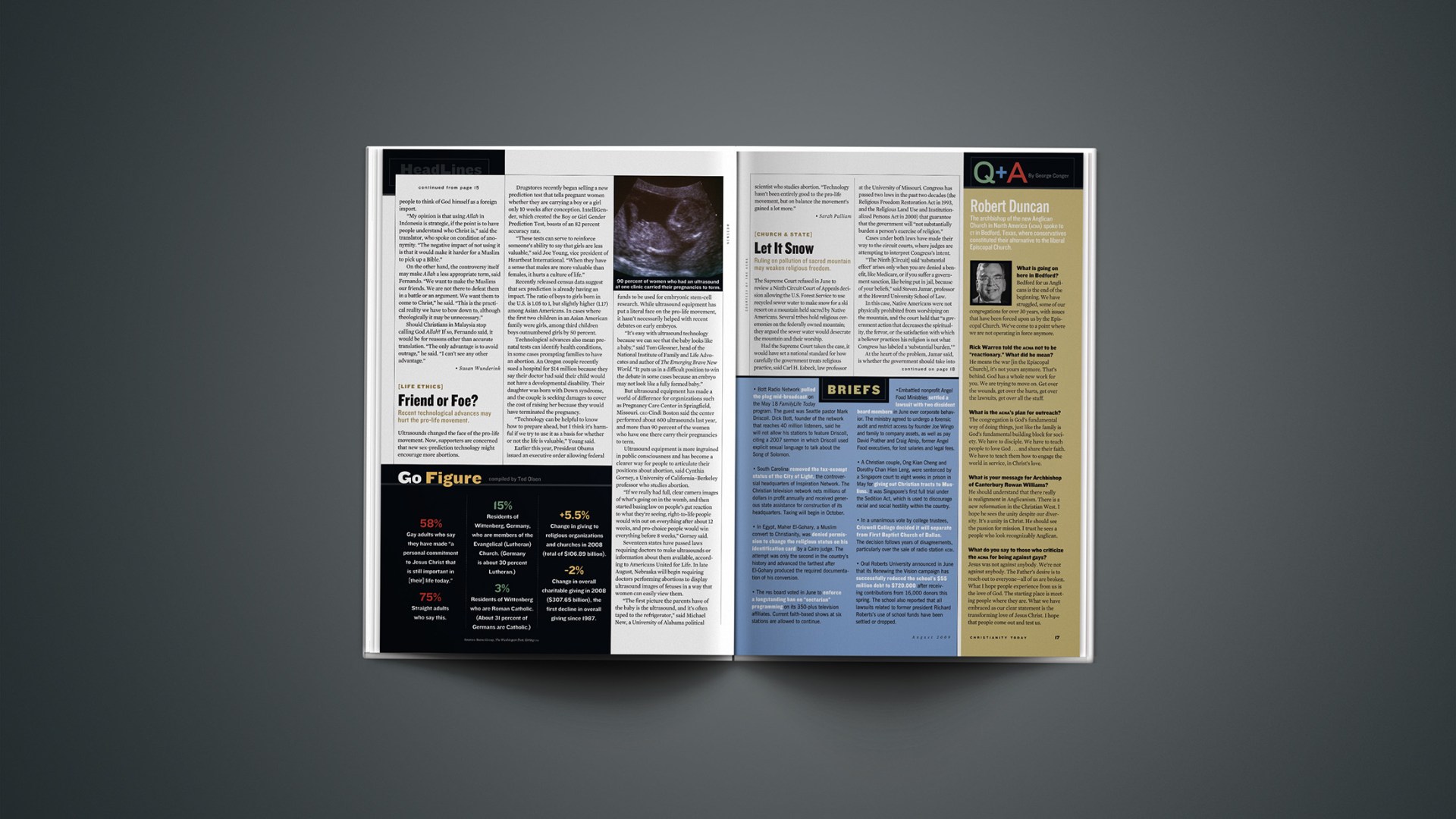Ultrasounds changed the face of the pro-life movement. Now, supporters are concerned that new sex-prediction technology might encourage more abortions.
Drugstores recently began selling a new prediction test that tells pregnant women whether they are carrying a boy or a girl only 10 weeks after conception. IntelliGender, which created the Boy or Girl Gender Prediction Test, boasts of an 82 percent accuracy rate.
“These tests can serve to reinforce someone’s ability to say that girls are less valuable,” said Joe Young, vice president of Heartbeat International. “When they have a sense that males are more valuable than females, it hurts a culture of life.”
Recently released census data suggest that sex prediction is already having an impact. The ratio of boys to girls born in the U.S. is 1.05 to 1, but slightly higher (1.17) among Asian Americans. In cases where the first two children in an Asian American family were girls, among third children boys outnumbered girls by 50 percent.
Technological advances also mean prenatal tests can identify health conditions, in some cases prompting families to have an abortion. An Oregon couple recently sued a hospital for $14 million because they say their doctor had said their child would not have a developmental disability. Their daughter was born with Down syndrome, and the couple is seeking damages to cover the cost of raising her because they would have terminated the pregnancy.
“Technology can be helpful to know how to prepare ahead, but I think it’s harmful if we try to use it as a basis for whether or not the life is valuable,” Young said.
Earlier this year, President Obama issued an executive order allowing federal funds to be used for embryonic stem-cell research. While ultrasound equipment has put a literal face on the pro-life movement, it hasn’t necessarily helped with recent debates on early embryos.
“It’s easy with ultrasound technology because we can see that the baby looks like a baby,” said Tom Glessner, head of the National Institute of Family and Life Advocates and author of The Emerging Brave New World. “It puts us in a difficult position to win the debate in some cases because an embryo may not look like a fully formed baby.”
But ultrasound equipment has made a world of difference for organizations such as Pregnancy Care Center in Springfield, Missouri. CEO Cindi Boston said the center performed about 600 ultrasounds last year, and more than 90 percent of the women who have one there carry their pregnancies to term.
Ultrasound equipment is more ingrained in public consciousness and has become a clearer way for people to articulate their positions about abortion, said Cynthia Gorney, a University of California Berkeley professor who studies abortion.
“If we really had full, clear camera images of what’s going on in the womb, and then started basing law on people’s gut reaction to what they’re seeing, right-to-life people would win out on everything after about 12 weeks, and pro-choice people would win everything before 8 weeks,” Gorney said.
Seventeen states have passed laws requiring doctors to make ultrasounds or information about them available, according to Americans United for Life. In late August, Nebraska will begin requiring doctors performing abortions to display ultrasound images of fetuses in a way that women can easily view them.
“The first picture the parents have of the baby is the ultrasound, and it’s often taped to the refrigerator,” said Michael New, a University of Alabama political scientist who studies abortion. “Technology hasn’t been entirely good to the pro-life movement, but on balance the movement’s gained a lot more.”
Copyright © 2009 Christianity Today. Click for reprint information.
Related Elsewhere:
Christianity Today has special sections on abortion and life ethics on our site, including:
After George Tiller’s Death | Pro-life advocates wonder whether doctor’s murder will reshape debate. (June 16, 2009)
Abortion Violence and American Democracy | The ironic relationship between the pro-life movement and its radical fringe. (June 3, 2009)
Be Careful What You Wish For | Access to federal money may be mixed blessing for embryonic research. (April 23, 2009)
See our news section and liveblog for more news updates.










